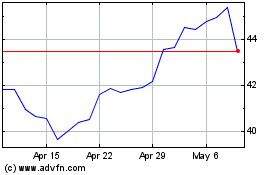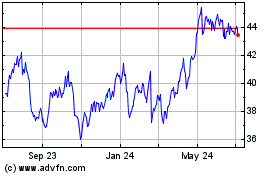China Slows as Stimulus Impact Wanes
August 12 2016 - 2:10AM
Dow Jones News
BEIJING—A swath of economic activity—from factory output to
investment and retail sales—slowed last month, reflecting renewed
weakness in China's economy as the effects of earlier government
stimulus wane.
Industrial production, long a rough proxy for growth in the
world's second-largest economy, rose 6.0% in July from a year
earlier, according to government data released Friday. The pace was
slower than the 6.2% growth recorded in June—a rate economists
expected would be sustained in July.
Investment in factories, buildings and other fixed assets in
nonrural areas climbed 8.1% on year in the January-July period,
decelerating from the 9% increase in the first six months of the
year and again lower than the 8.9% predicted by economists.
"The Chinese economy is definitely on the downward trend. That
hasn't changed," said Ma Xiaoping, an economist with HSBC.
Ms. Ma said demand from both home and abroad is still weak and
investors are downbeat about China's economic outlook.
July's snapshot of China's economy shows how broad the slowdown
is becoming and how vexing that is becoming for the government.
Growth of private investment, which accounts for around 60% of
total fixed-asset investment, slipped to a record low of 2.1% in
the first seven months, shrugging off recent official efforts to
slash red tape and reduce market barriers to encourage more
spending.
As companies hold off spending, government officials and
economists have warned that China is falling into a liquidity
trap—when investors hoard cash rather than invest despite
government moves to put more money into the economy.
Sheng Laiyun, a spokesman for the National Bureau of Statistics,
acknowledged at a briefing Friday that many private businesses are
reluctant to expand amid cooling growth.
"Economic performance in July was indeed slower as the domestic
and global economies are still undergoing deep adjustment," Mr.
Sheng said at a briefing. He said the government still has room to
expand infrastructure investment in the coming months to bolster
growth.
Meanwhile, retail sales, which has been a bright spot in the
economy, also showed signs of softness, growing 10.2% in July from
a year earlier, down from 10.6% in June. That was short of the
10.5% rise expected by economists.
After rolling out many stimulus measures—including flooding the
economy with record-high credit and speeding up government spending
on infrastructure investment—China's policy makers have started to
rethink the growth model for the economy. At a policy meeting late
last month, the Politburo, the Communist Party's top
decision-making body, cautioned against debt-fueled growth and
rising asset bubbles.
The central bank suggested in its latest monetary policy report
released last week that it may refrain from adopting aggressive
easing measures out of concern that freeing up more funds for
lending would put more pressure on the Chinese currency to
depreciate.
"The government is cautious on rolling out large stimulus
package. However, targeted and small stimulus will reduce the
downside of the economy, but only provides limited and short-lived
support as well," said Zhou Hao, an economist with CommerzeBank
AG.
Grace Zhu and Liyan Qi contributed to this article.
(END) Dow Jones Newswires
August 12, 2016 01:55 ET (05:55 GMT)
Copyright (c) 2016 Dow Jones & Company, Inc.
HSBC (NYSE:HSBC)
Historical Stock Chart
From Mar 2024 to Apr 2024

HSBC (NYSE:HSBC)
Historical Stock Chart
From Apr 2023 to Apr 2024
